Looking for plastic waste statistics, facts, figures and studies? Then you've come to the right place! By 2050, there could be more plastic floating in the sea than fish. And in Germany, we use around 320,000 disposable coffee cups every hour.
Worrying data, isn't it? Such results from scientific studies, as well as general statistics and facts on global plastic waste, are crucial in helping to sensitize people to use plastic more consciously and to reduce their impact on the environment. to live as plastic-free as possible.
Because our society has a massive problem with plastic waste. The material is not biodegradable and once thrown away, the waste remains in the environment. Plastic waste in the environment foreverwhere it kills animals and destroys ecosystems. There is also a danger for us humans.
In this article, I would like to give you an understanding of the most important plastic waste facts, figures and statistics from scientific studies. From consumption data and environmental impact figures to alarming forecasts for the future. Let's go!
Here's another quick overview for you:
My please: Share this article if you want to use statistics and facts from it. You can use the web address of this page or the following reference. Thank you for your support!
https://www.careelite.de/plastik-muell-fakten
Citation: C. Schulz; CareElite.de (2024): Plastic waste statistics, facts, figures & studies 2023/2024, available at https://www.careelite.de/plastik-muell-fakten
Plastic waste consumption data
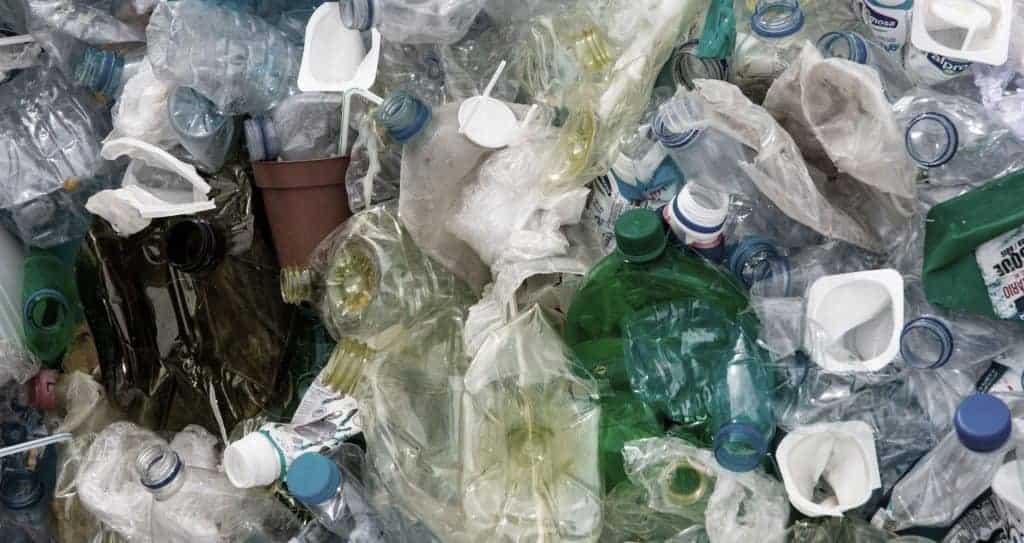
These facts about plastic waste consumption and the types of plastic waste should give you an idea within a few seconds. Impression of consumer behavior our (global) Disposable society provide
How much plastic waste do we leave behind?
- Around 41 kilograms of plastic packaging waste is what we Germans produce per capita each year. Only in Ireland (74.07), Iceland (44.55) and Portugal (41.32) is consumption even higher at European level. (Source)
- About 0.74 kilogram On average, every person produces plastic waste globally every day. The amount increases with increasing prosperity. (Source)
- About 40 percent of plastic products consumed end up in the bin after less than a month. (Source)
- Around 4 kilograms Microplastics are released into the environment per capita per year in Germany. (Source)
- 5.67 million tons of plastic are consumed in Germany every year. (Source)
What plastic waste are we leaving behind?
- Around 45 plastic bags are consumed per capita in Germany every year - including self-service shirt bags. (Source)
- Only 25 minutes is the average useful life of a plastic bag in Germany. (Source)
- Around 320,000 Coffee2Go cups are consumed per hour in Germany. That's almost 3 billion disposable cups per year. (Source)
- 500 billion Coffee2Go cups are consumed worldwide each year. (Source)
- Around 40 billion disposable straws of plastic are consumed per year in Germany alone. (Source)
- 583.3 billion plastic bottles are sold worldwide every year. (Source)
- Around 640,000 tons of plastic waste in the sea per year is caused by the fishing industry alone. (Source)
How long do plastic goods last on average?
Different plastic products also have a different, average Useful life. Here you will find the relevant figures and statistics from the last plastic atlaspublished by the Bund für Umwelt und Naturschutz Deutschland.
How long the plastic items last from the respective area on average:
- Packaging: 0.5 years
- Consumer goods: 3 years
- Textiles: 5 years
- Electronics: 8 years
- Transportation & Traffic: 13 years
- Industrial machinery: 20 years
- Construction sector: 35 years
Statistics on the production of plastic
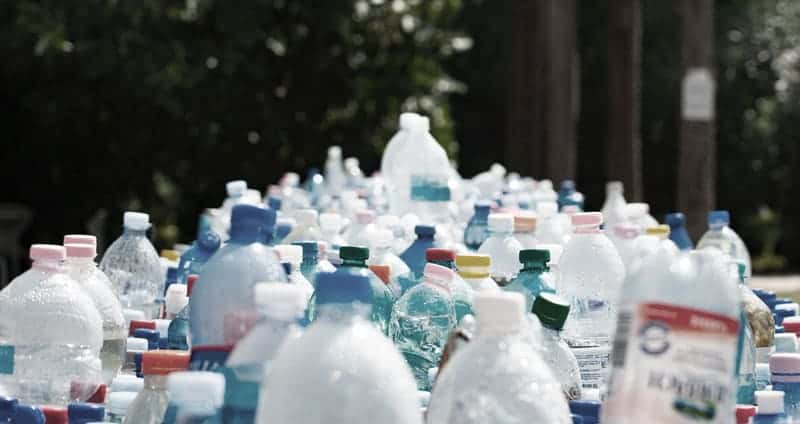
Here you will find facts and figures on the production of plastics as well as their recycling. I personally find it frightening in which large and constantly growing quantities we humans produce plastic.
How much plastic is produced?
- 21.3 million tons of plastic are produced in Germany every year. (Source)
- 391 million tons of plastic is produced by the global plastics industry every year. (Source)
- About 8.3 billion tons of plastic were generated worldwide by 2015 alone. (Source)
- About 56 percent - more than half - of the plastic ever produced worldwide has been produced since the year 2000. (Source)
- Around 12 percent of global oil production requires the production of Plastic per year. (Source)
- Around 36 percent of global plastic production result in packaging material. A further 14 percent is used for textiles and around 16 percent for buildings and other construction work. (Source)
How much plastic waste is recycled, landfilled and shipped abroad?
- 46 percent is the recycling rate for plastic waste in Germany. Out of a total of around 6.15 million tons of plastic waste, around 2.8 million tons of plastic are fed into the recycling cycle. (Source)
- Around 53 percent of the plastic waste generated are burned to generate energy. (Source)
- Over 10 percent of German packaging waste are exported abroad. For example, 9 percent is transported by ship to Malaysia and 4 percent to Indonesia. (Source)
- With around 925,953 tons of plastic waste exported Japan leads the list of top global exporters, closely followed by the USA and Germany. (Source)
- Only around 9 percent of the world's plastic waste is recycled. (Source)
Statistics on plastic waste in the environment/ocean
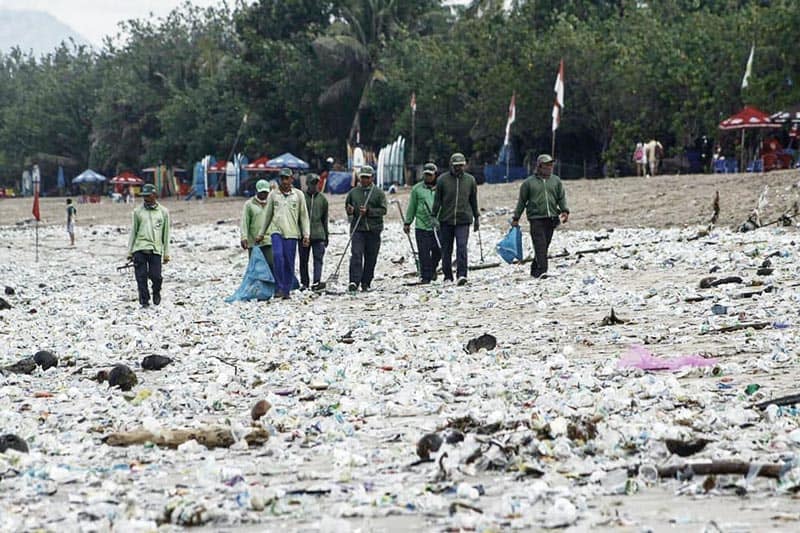
You have now learned about the consumption-related figures for plastic waste in Germany and the world. With the following facts, I would like to give you a feeling for the Follow of excessive plastic consumption for the environment.
How much plastic waste is already in the environment or is constantly being added?
- Around 10 million tons of waste end up in the environment every year. Around 75 percent of this is plastic waste. (Source)
- More than 100 million tons of plastic waste are estimated to have entered the sea so far. Around 1 percent of this floats on the sea surface. Around 33 percent can be found along the coasts and on the seabed, around 27 percent in coastal waters and around 39 percent in the open sea between the surface and the seabed. (Source)
- Around 81 percent of plastic waste in the sea originates from Asian countries, including Thailand, China, Indonesia, India and Vietnam. (Source)
How quickly do plastic objects decompose into microplastics?
Anyone who finds out about plastic waste statistics should also know how long plastic waste remains in the environment. The longer, the greater the danger. One Plastic bottle in the sea, for example, takes at least 450 yearsto decompose.
However, the plastic waste only dissolves into smaller, barely visible plastic particles. How long a Disposable diaper, by Cup holder, a Fishing line and many other things for decomposition, you can find out more on the Graphic of the Federal Environment Agency.
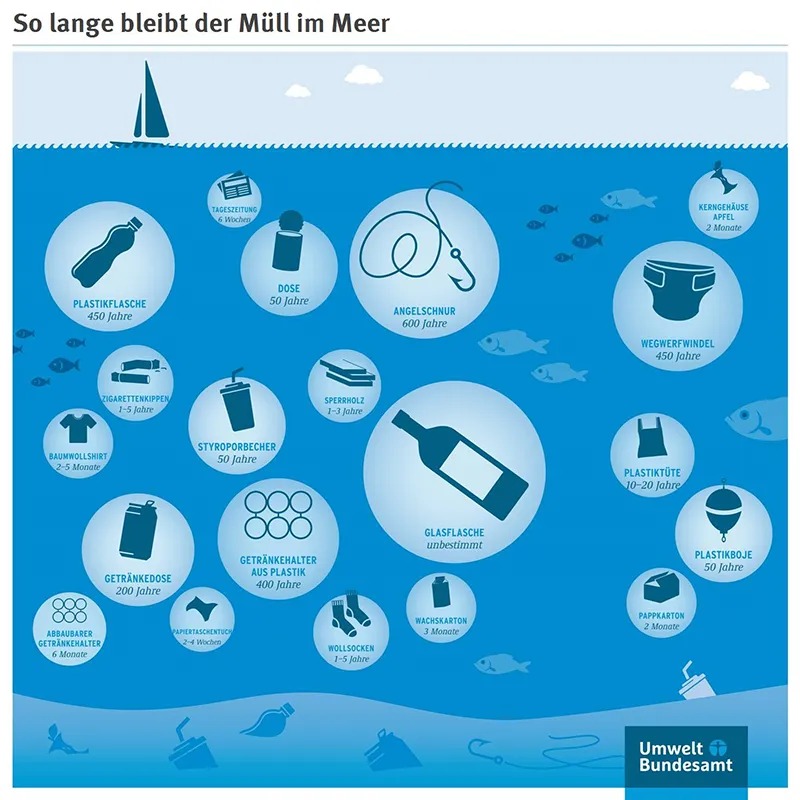
How many animals die from our plastic waste?
As plastic waste is not biodegradable, it does not massive damage in nature on. Here are the relevant plastic waste statistics on the impact on wildlife that should motivate you to do something about it.
- Around 1,000,000 seabirds and 135,000 marine mammals die every year from contact with our plastic waste. (Source)
- More than 600 different marine creatures are harmed by plastic waste in the sea. (Source)
- At least 15 percent of all species are endangered by ingestion of - or strangulation in - plastic parts. (Source)
- 34 Plastic parts is already the average size of each fulmar's stomach. (Source)
What are the statistics on the major trash swirls?
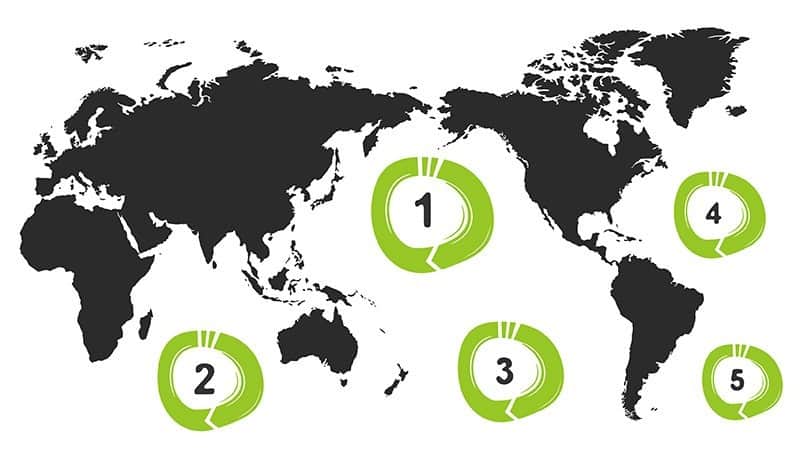
The Ocean currents drive human waste into the oceans and allow it to circulate. There are at least five huge Plastic waste swirl.
To give you an idea of the scale of the project, here are some facts about the Great Pacific Garbage Patchthe world's largest plastic waste vortex. They all come from the Dutch company The Ocean CleanUp.
- About 1.6 million square kilometers is the size of the Great Pacific Garbage Patch. That is about three times the area of France and 4.5 times the area of Germany.
- 1.8 trillion plastic parts are estimated to be floating in the Great Pacific Garbage Patch alone and are thought to weigh around 80,000 tons in total.
- About 250 plastic parts is the average amount that each person in the world has contributed to the Great Pacific Garbage Patch.
- Around 46 percent of the plastic in the Great Pacific Garbage Patch are fishing nets.
Microplastic & Health Statistics

What consequences Plastic in our meals for our health is still unclear. largely unexplored. However, it is clear that small microplastics have already led to inflammation, physiological disorders and higher mortality rates in marine animals.₄₁
Here you will find among other things facts about Microplastics in cosmetics and the plastic in our mineral water.
- Around 922 tons of microplastics are consumed in the manufacture of cosmetic products in Germany every year. (Source)
- Around 90 percent of all eye make-up and 73 percent of all lipsticks contain microplastics. (Source)
- In each of 38 different mineral watersmicroplastic particles were found in the water that researchers examined. (Source)
- Each of 8 human stool samples tested from eight different countries contained microplastics. (Source)
Helpful studies with statistics about plastic waste
Here you will find an overview of the most important and meaningful studiesthat have been carried out in Germany and globally on the plastic waste problem. Take a look inside to find out even more precise statistics, facts and figures about plastic waste.
- Kaandorp MLA et al (2023): Global mass of buoyant marine plastics dominated by large long-lived debris.
- H. Ritchie, V. Samborska and M. Roser, Global Change Data Lab: Plastic Pollution.
- ELLEN MACARTHUR FOUNDATION: The New Plastics Economy: Rethinking the future of plastics.
- P.G.C. Nayanathara Thathsarani Pilapitiya, Amila Sandaruwan Ratnayake: The world of plastic waste.
- UNEP: Marine Plastic Debris and Microplastics: Global lessons and research to inspire action and guide policy change.
- Heinrich Böll Foundation and the German Federation for the Environment and Nature Conservation: PLASTIKATLAS 2019 - Facts and figures about a world full of plastics.
- Lebreton, L., Slat, B., Ferrari, F. et al: Evidence that the Great Pacific Garbage Patch is rapidly accumulating plastic.
- Science Advances: Production, use, and fate of all plastics ever made.
Do you know of any other important studies? Then feel free to share them with me in the comments!
Plastic waste figures & forecasts for the future
Time and again, we hear about scientific forecasts that Future picture of the consequences of our plastic mania draw. Here I have recorded the estimates, which should of course be treated with caution, but are by no means unrealistic.
- Twice as much plastic as todaywe humans will probably consume in 2050. (Source)
- Four times as much plastic waste as today is estimated to be floating in the sea by 2050. (Source)
- More plastic parts than fish in the seais forecast for the year 2050. (Source)
- 99 percent of all seabirds will have plastic in their stomachs by 2050. (Source)
- Around 20 percent of global oil production will probably require the production of plastic in 2050 (Source)
- About 56 gigatons of CO2 is what the plastics we produce are expected to have produced by 2050. (Source)
Conclusion on the plastic waste figures for 2023/2024
Plastic has advantages, but Plastic also has its disadvantages. The plastic waste statistics, figures, data, facts and various studies reveal that we are facing an incredibly big task both in Germany - and of course globally!
We have to change our behavior and learnto deal with plastic in such a way that no living creature in this world suffers as a result. Because through our current use of plastic, we have created one of the biggest environmental problems of our time created.
So learn as much as possible in the article about plastic free life, like you avoid plastic waste in your everyday life really easily simply by following your heart.
"«It's just a straw», said 8 billion people."
Unknown (more under Zero Waste Quotes)
It's time to rethink. I hope that I have been able to inspire you with these statistics and facts about plastic and the plastic waste we produce. Feel free to share them with other people to make an even bigger impact. Here is the source again:
https://www.careelite.de/plastik-muell-fakten/
Do you have any questions, suggestions or other valuable data? Then please write a comment below this article.
Stay clean,

PS: You can also use my Tips for a bathroom that is as plastic-free as possible and the Kitchen without plasticto make a real difference. Good luck with the implementation!







simply not drauf reagiren wär keine Lösung wies noch nicht mal ob ich jetzt noch Kinder kriegen möchte bei so einer Zukunft .kannst du tippst geben wie man plastik sparen kann(;
Hey Josi! Right!
Look in the post about the plastic free lifestyle. You'll get countless tips there.
Best regards
Christoph
I found the text on the subject of plastic very interesting and am just about to get completely away from plastic. As you know it but you still have old Tupperware and plastic bowls. I am looking for my plastic stuff sustainable to dispose of or that maybe someone can still do something sustainable with it. Can you help me there?
Hey Kathi! Look at the post live plastic freen. There you'll find out everything you need to know about making your everyday life as plastic-free as possible. Try giving the Tupperware to neighbors, clubs, or food banks - or sell them on eBay Classifieds.
Best regards
Christoph
Thank you for this great website.
I'm giving a presentation for an international seminar soon and the facts and figures I could find here are very helpful for that!
Hi Jo! Thank you for your feedback and good luck!
Best regards
Christoph
we have soon a presentation on the subject, and have found a lot of useful information on your site. thank you for it. lg Annika and Julia from the Baltic Sea
Hi you two! Thanks for the great feedback on the post. I hope you were able to make many people aware of the plastic waste problem.
Best regards to the sea,
Christoph
Dear Christoph,
Unfortunately, the button for the itemizations does not work.
However, I would be very interested in the individual sources.
Would it be possible to get the footnotes?
Dear thanks, Lena
Hi Lena! It works for me. Where do the proofs not open? On mobile, desktop and with which browser? Try it alternatively with another browser.
Thanks for your feedback!
Many greetings
Christoph
Thanks - it was indeed the Chrome browser. With Internet Explorer, the footnotes were viewable without a problem. Thanks for the great summary of the data.
Thanks for your feedback! Always gladly!
Many greetings
Christoph
You want to fight plastic and then an e-book (made of plastic) is given away at the top right?
How about doing that for a donation at least?
Hi Dirk! This is a PDF file that comes to you 100% plastic-free per email 😉
Best regards,
Christoph
By how many tons does the production of plastic increase annually?
Hi there. Here is a graph that will help you, because it shows the course from 1950 to 2013: https://www.businessinsider.de/studie-zeigt-produktion-von-plastik-hat-dramatisch-zugenommen-2017-7
Best regards,
Christoph
Hey Christoph,
I am currently researching for my own plastic-related project and came across your super interesting article! In this train I have a question right away. You write that the first plastic product came on the market in 1950. Do you know what exactly that was?
I would be very happy to receive information 🙂
Many greetings,
Désirée
Hi Désirée!
PVC, for example, has been produced on a large scale since 1938. Before that, there were a number of discoveries and developments dating back to the 19th century. Just search for the history of plastic. (you've given me another new idea for an article, thank you! 😉 )
Many greetings
Christoph
Hey Christoph,
top, thanks for the tip!
Then I'm curious what you write about the history of plastic ?
If you're curious to see how your idea turns out, feel free to check out the website of me and my team, which I've included below ?
Many greetings,
Désirée
Hello Christoph,
Your efforts are exactly right and I also think it's good that you want to educate people about this. I am currently writing a thesis on the subject of recycling and came across this page. Basically, I think your work is good, but you should be more precise with facts and figures. Can you forward me the sources for the "plastic waste statistics 2017 and 2016"? I would like to use the numbers, but I need a reliable source. Unfortunately, I could not find anything under the given source for 1) either.
Love greetings
Philipp
Philipp, the figures were not always based on sources and studies - some values come from articles in Die Zeit or the FAZ, where they were used without citing a source. If there is no source here, I can't help you at the moment. However, I constantly search the latest studies and update this article with well-founded statistics on the topic of plastic waste.
Best regards
Christoph
Hello,
thank you for the interesting page. I have been very interested in plastic avoidance for some time and am trying to change my behavior. Unfortunately, we in Germany can hardly change anything directly in the littering of the world's oceans, except to set a good example. The main polluters are not the Europeans or the USA but mainly China, Indonesia, the Philippines, Vietnam and Thailand. As far as I know, the reason for this is a non-functioning waste disposal or free storage of waste, whereby the plastic is carried into the sea by the wind. I.e. not that we should continue as before, but these facts must unfortunately be taken note of. So we cannot solve the problem alone or not at all.
Hi Hannes, thanks for your comment. We can solve it, but only together. You are right that "dumping" of garbage is a very big problem. We need to share our knowledge about modern recycling methods and how to deal with plastic to all countries. I look forward to hearing from you again.
Stay clean,
Christoph
Hello, great that I found your site. It is really scary that the most intelligent species on this planet is slowly but surely abolishing itself. We need to get into the heads of people to show that it can be done differently.
I have reoriented myself professionally and offer the optical retail sun and correction glasses from marine plastic waste and used fishing nets. For this purpose, we collect up to 1 ton of plastic waste on beaches in Spain every day. The local fishermen support us and bring the garbage from their nets ashore as well. Please support our small company.
Hi Dirk! I think that's great, thanks for your comment. Maybe you should team up with Pure Clean Earth in Barcelona, they also collect trash almost every day. Come gladly in our Global Beach CleanUp Group for more support.
Greeting Christoph
Hi Christoph,
I think it is very good that you are getting involved in this matter. I am also very professionally involved with the topic of recycling, bioplastics and the entire waste problem.
I work in a company that manufactures plastic packaging. We are very confronted with the fact that, due to the increasingly (rightly) prominent discussion about plastic waste, our business customers are cautious about the topic of plastic.
But what I always notice is that the focus of the discussions misses the point or at least doesn't get to the heart of the matter. You also write in your blog about the plastic components of our cosmetics. This has been under discussion for several years now and is certainly not absolutely necessary.
However, this (unnecessary) share of microplastic is vanishingly small compared to other sources of microplastic. By far the largest share of microplastics is generated, for example, by tire abrasion in vehicles; even the abrasion of synthetic fibers in textile washing is assumed to be 4 times higher in a study by the Fraunhofer Institute UMSICHT.
Likewise, the Helmholtz Centre for Environmental Research in Leipzig, Germany, in a study, named only 10 rivers worldwide as the cause of 90% of all waste in the oceans.
Everyone can find a way to live more sustainably for themselves. However, we can only get to grips with the real problem if we achieve a change in thinking worldwide. And that, of course, is a very difficult undertaking.
Keep up the good work with your site, I like it.
Kind regards, Michael
Hello Michael! Thank you for your objective comment. I also always try to see both sides. Regarding the microplastic problem, I know of course that cosmetics are only a fraction of what tire abrasion does. However, I also see that we are putting these plastic cosmetics on our faces or rubbing them on our bodies - very concerning for our health, no matter in what quantities.
That's right, we have to act globally - together. I do my best to accompany people for the topic. Let's keep it up and keep making a difference. Even if it feels like progress is slow, we're getting closer to the goal.
Stay clean,
Christoph
good that you sic for it
Thank you Martin 🙂
Hello Christoph,
I somehow don't quite understand why I should reduce my plastic consumption for the environment if I dispose of the plastic normally in the trash. Apparently, almost everything in Germany is either incinerated or recycled and almost nothing ends up in landfills. It is clear to me that more plastic should be recycled and I am also aware of the plastic problem in the world, but Germany is actually rather a role model for other countries in terms of recycling, or not?
I would be very happy to receive an answer 🙂
Kind regards,
Sarih
Hi Sarih, thanks for your comment.
Plastic consists of petroleum or raw gasoline, a limited raw material. Even though our recycling rate is high, too much is burned -> which means that the limited raw material is being destroyed here. Even if we have a high recycling rate in comparison, that doesn't mean we should rest on it. Because the rate is still lousy.
In Germany, too, we have a lot of Plastic waste in the environmentespecially microplastics.
And isn't it a cool feeling when you manage to consume in an environmentally conscious way so that you haven't produced 10 bags of plastic waste every month? 🙂 Take a look at the article Zero Waste Lifestyle an.
I look forward to your next comment and have a great evening.
Stay clean,
Christoph
You've already read the article, right?
Most of the plastic waste in Germany is exported (for recycling, but it is not proven that this happens according to the German / European guidelines).
It is very cynical to talk about recycling plastic in developing countries when we export most of our plastic waste to these countries. Everybody should recycle / dispose of his own garbage, but you can't earn money with it, so it is shipped around the world (which consumes fuel again).
The best way to deal with the problem is to reduce plastic production and consumption from the outset.
This is an extremely complex topic, because in the end there is also an energy balance to be seen: much of what is produced from plastic today was produced from other materials in the past, which requires significantly more energy (e.g. steel, aluminum, glass). Such value stream analyses can hardly be reduced to a few simple and striking sentences...
But I also always go shopping with folding box / net bags and basket, our consumption of plastic bags is about 2 bags per year for a family of four. Nevertheless, much more could be done, of course.
Dear Christoph,
We find this website very informative and would be very happy about further contributions.
Hi Hans Frans 😉
Thank you, you can expect the same!
Best regards,
Christoph
For the 11.7t plastic waste (see above) the unit million is missing.
According to the Federal Environment Agency, however, this should amount to 6 million tons of plastic...
You are absolutely right that far too much plastic is consumed and not dealt with sustainably (>recycling rate). But the units have to be right...
https://www.umweltbundesamt.de/daten/ressourcen-abfall/verwertung-entsorgung-ausgewaehlter-abfallarten/kunststoffabfaelle#textpart-2
Hi Max and thanks for your tips! Is already adjusted.
Everyone must look at their own nose, consumer, manufacturer, large corporation, politics.
If we stop buying the plastic crap, manufacturers will gradually understand that, too. But we have no time to lose.
Love greetings
Christoph
Are there concrete, valid figures in terms of:
How many plastic BAGS from Germany end up in the sea?
How do 1x used plastic bags compare to 1x used paper bags when incinerated after use?
Are there any serious studies that prove that and how exemplary German behavior changes the attitudes of the Third World? World change?
Sincerely
Hi Hanns,
Unfortunately, I do not have any figures on this, as the cases are very specific.
We only change something in third world countries if we go into direct exchange with each other.
We have to pass on our knowledge so that no time is lost there.
Stay clean,
Christoph
Hello Christoph,
I'm new to the blogger/less waste world - but better late than never 🙂
I have linked your blog with me and would be happy if you ever stop by.
Have a nice weekend you!
Many greetings from Frankfurt,
Laura
Hi Laura! You've put together a great site 🙂
Thanks for your feedback and let's make a difference together!
Many greetings,
Christoph
Both sides do not exist !
Hello dear Santa Claus,
which pages are we talking about exactly?
Many greetings
Christoph
Hello Christoph,
Thank you very much for this article. I would be interested in the direct links to the plastic waste statistics 2016 and 2017. I always find the context quite interesting.
Thank you for your time and help,
Manuela
Hi Manuela, thanks for your comment! Many of the facts are taken from the Ellen MacArthur Foundation study "The New Plastics Economy"->. https://www.ellenmacarthurfoundation.org/publications/the-new-plastics-economy-rethinking-the-future-of-plastics
I hope I was able to help you further and wish that this year many more studies on the topic of Plastic waste in the environment be brought out.
Many greetings,
Christoph
Here is a link to the numbers from the federal Environmental Protection Agency.
https://www.umweltbundesamt.de/presse/pressemitteilungen/verpackungsverbrauch-in-deutschland-weiterhin-sehr
Of the ~220 kg of packaging waste per capita in Germany, ~25 kg is plastic waste. The largest part is paper and cardboard.
Dear CHristoph,
May I ask where you got this figure from and in what volume (million, billion or per capita?) Unfortunately, I can't find anything about it in the current (stated statics).
Thank you
"At 11.7 tons, Germany consumes more plastic than any other country in Europe. (Plastic waste statistics 2016)"
Hi Lina, the value comes from a separate statistic called "The Plastic Age" - however, I can't provide you with a download link right now, but will do another search.
Many greetings
Christoph
Many greetings, Christoph
hi alex! 😉
Pingback: So little plastic is really recycled ??! - plastic isnt fantastic
Is plastic waste that is not recycled dumped into the sea in Germany?
Hi Blck! What do you mean? Whether the portion of garbage that is not recycled ends up in the ocean? A large part ends up in the environment and then sooner or later also in the sea, exactly.
Just read a new article about the Garbage whirlpool in the sea published, take a look at it.
Love greetings
Christoph
Christoph,
What "Blck" meant (and I think you understood) is that plastic waste that accumulates in Germany is incinerated or recycled. Nothing ends up in the sea. If only because it makes no economic sense.
So it brings zero point zero nothing in Germany to drive the tax burden for the average citizen into the immeasurable, as a punishment for the fact that third world countries dispose of their waste in the oceans.
This is blind actionism and only plays into the hands of politicians, who are lining their pockets with the ignorance and credulity of the people.
Hi Timo! Thanks for your comment. There is no need to increase the tax burden either, who says? It's more about bans on unnecessary plastic, such as plastic bags. This should also be introduced not only in Germany, but worldwide. Currently, the first cities and countries are starting to do this.
Greeting Christoph
Dear Conservationists,
You are absolutely right: we are facing a waste catastrophe. Not only in the oceans. To avoid it, political regulations must be made, especially in Europe. Especially in Southern Europe - Greece, Italy (Sicily) etc. nature and the sea have been deliberately abused as a garbage dump for decades. The reason e.g. for garbage on land and in the sea, especially plastic and glass bottles: No take-back system, no recycling, no garbage collection, and a disastrous attitude towards the environment. There is a clear North-South divide in this problem, although there are enough environmental sows here who throw their garbage into the forest. For the main polluters, the Mediterranean countries, only strict EU rules and regulations remain. E.g. recycling or take-back regulations! But: Who knows these countries, knows around their life world and purchase culture. There are hardly any supermarkets like ALDI etc., but more small stores, which cannot cope with such procedures. In the south of Europe and in large parts of the world, there is no take-back procedure for plastic bottles etc. anywhere. As long as nothing is regulated there we don't need to think about the rest of the world and the oceans for a second. Unfortunately! With well-meant appeals and actions we Central Europeans do not get any further. A few garbage collection ships or engaged activists do not advance also with many donations. The lever lies first with (European) politics. Where are our GREENS in Europe?
Greetings
Hi Fritz, thank you very much for your detailed comment 🙂
You are absolutely right. I hope that politicians wake up. We can only do our homework and adapt our habits, live more plastic-free and reduce waste as much as possible. Due to the change in demand, politicians and companies must also follow suit. Of course, I would like to see politicians take this step immediately, because fees, taxes and penalties can quickly change people's minds.
Best regards
Christoph
Certainly in Europe there is also potential for improvement. The megacities in Africa produce huge amounts of waste and practically nothing is burned or recycled there. I think the Europeans are already quite progressive.
Hi Dominik! We are definitely progressive, however, so far masses of plastic waste have also been shipped to China because we are no longer in control of the situation. Now Germany is facing a big challenge because of all the plastic waste and I hope that a general rethinking will take place.
But it doesn't matter where the garbage comes from, because in the end we all eat the fish that have microplastics in their cells.
Many greetings,
Christoph
Comments are closed.